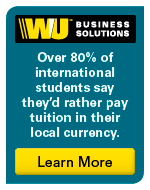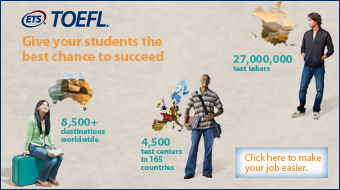
| IIE Home | Membership | Publications | Open Doors | Contact Us | Subscribe |
|
||||||||||||||
|
||||||||||||||
|
News
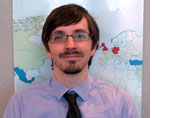 James King from IIE’s Scholar Rescue Fund shares about his recent visit to Lebanon as part of a study on the Syrian refugee crisis and its impact on higher education. "As the conflict enters its fourth year, the situation is as bleak as ever," writes King. "Tens of thousands of Syrian faculty and university students have fled the violence to neighboring countries like Lebanon." King identifies challenges faced by Syrian students seeking to pursue university education in Lebanon and abroad and offers recommendations for the international community to help address these challenges. James King from IIE’s Scholar Rescue Fund shares about his recent visit to Lebanon as part of a study on the Syrian refugee crisis and its impact on higher education. "As the conflict enters its fourth year, the situation is as bleak as ever," writes King. "Tens of thousands of Syrian faculty and university students have fled the violence to neighboring countries like Lebanon." King identifies challenges faced by Syrian students seeking to pursue university education in Lebanon and abroad and offers recommendations for the international community to help address these challenges.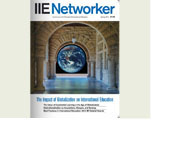 In his article in IIE’s newly released IIENetworker magazine, author George Kacenga writes about international education’s uncertain future in an increasingly integrated global marketplace. Kacenga depicts Colorado as a frontier state with universities confronting reduced resources and rapidly changing measures for predicting recruitment, retention, and graduation of students. "International enrollment management is a moving target," writes Kagenga, who argues that internationalization strategies must be "apt to the context of the institution, its faculty and students, and the community that it seeks to serve." In his article in IIE’s newly released IIENetworker magazine, author George Kacenga writes about international education’s uncertain future in an increasingly integrated global marketplace. Kacenga depicts Colorado as a frontier state with universities confronting reduced resources and rapidly changing measures for predicting recruitment, retention, and graduation of students. "International enrollment management is a moving target," writes Kagenga, who argues that internationalization strategies must be "apt to the context of the institution, its faculty and students, and the community that it seeks to serve."Recognizing the potential for of STEM fields for economic development, 22 Arab states signed a strategy last month to boost education and research in STEM fields through better regional cooperation. "The [strategy] is squarely aimed at a number of persistent challenges in higher education and research in the region," reports the ICEF Monitor, "Chief among those is a concern that research in Arab institutions and research centres is not sufficiently serving the needs of either industry or society."
By 2020, China’s college-educated talent pool is expected to be larger than the entire U.S. labor force, according to a recent feature in Businessweek. "China is giving Westerners something new to worry about: a generation of workers able to compete in higher-technology endeavors," writes David J. Lynch. "As Chinese companies grow more capable—what economists call ‘moving up the value chain’—they will encroach on markets now dominated by advanced economies."
Prime Minister Shinzo Abe and U.S. President Barack Obama confirmed a goal proposed at U.S.-Japan Conference on Cultural and Educational Interchange (CULCON) to double the number of Japanese studying at U.S. universities by 2020. Japan News carried an article about the Japanese government’s growth strategy addressing Japan’s declining study abroad numbers.
Conferences
April 30, 2014, 6:45 PM | Institute of International Education, 809 United Nations Plaza
Marwan Muasher's new book The Second Arab Awakening and the Battle for Pluralism is founded on his long experience as a diplomat and on a deep understanding of Arab history. Many in the West are profoundly disappointed that the euphoria of the "Arab Spring" has not yielded the results of their expectations.
While his important book is not about immediate events or policies or responses to the Arab Spring, it instead takes a long, judicious view of political change in the Arab world, beginning with the first Awakening in the nineteenth century and extending into future decades when—if the dream is realized—a new Arab world defined by pluralism and tolerance will emerge.
Marwan Muasher, former foreign minister of Jordan, asserts that all sides—the United States, Europe, Israel, and Arab governments alike—were deeply misguided in their thinking about Arab politics and society when the turmoil of the Arab Spring erupted. He explains the causes of the unrest, tracing them back to the first Arab Awakening, and warns of the forces today that threaten the success of the Second Arab Awakening, ignited in December 2010.
Should you wish to attend, please RSVP to Raquel Battle (rbattle@iie.org) by April 28th.
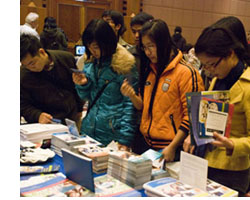 Early Bird Deadline: May 13, 2014 | Registration and Fair Details Early Bird Deadline: May 13, 2014 | Registration and Fair DetailsIIENetwork members receive a 10% discount over the regular registration price.
8,400 visitors attended IIE fairs last year. With over 30 years of experience organizing strategically marketed international student fairs, IIE can help you meet your student recruitment targets. IIE offers pre-fair seminars for students to learn about the U.S. higher education system and general admissions requirements—so you can be sure to meet well-informed, qualified students.
New this year: IIE is offering school visits, networking events with local school counselors, and expert informational seminars on country-specific trends in education in each city on our tour.
IIE’s U.S. Higher Education fair series helps you build your institution’s name and profile in selected cities in key Asian countries in a well-planned sequence, timed to minimize your travel and maximize your impact. Join us in this exciting and promising fall 2014 fair series:
IIE promotes direct communication between regionally accredited U.S. schools and students; no third party recruiters are agents are permitted at our events.
June 11-14, 2014 | Yokohama, Japan
Registration Deadline: May 20, 2014 | Registration and Conference Details
The International Association of University Presidents (IAUP) celebrates its general assembly every three years in a different part of the world. Each triennial focuses on a specific theme and provides its membership with an opportunity to discuss challenges and changes that face higher education worldwide. The General theme of the 2014 Conference will be Creating the Future of Higher Education.
Participants of the triennial conferences include the CEO’s of universities worldwide: Presidents, Chancellors, Vice Chancellors, Rectors, as well as worldwide leaders of governments, leaders of international and national associations and organizations, such as the United Nations, UNESCO, the World Bank, and leaders of the corporate sector.
In addition to a high quality academic program, participants at triennial conferences gain from the most outstanding opportunities of networking beneficial to their institutions/organizations, as well as unparalleled cultural experiences.
September 16-19, 2014 | Prague
Registration Deadline: May 31, 2014 | Registration and Conference Details
EducationUSA invites U.S. colleges and universities to participate in the EducationUSA Pavilion to promote U.S. higher education at the 26th Annual European Association for International Education (EAIE) Conference in Prague September 16-19, 2014. More than 4,000 higher education professionals from over 80 countries and 300 exhibitors are expected to participate in Europe's largest international education conference.
Join the EducationUSA Pavilion to:
EducationUSA is a U.S. Department of State-supported network of hundreds of advising centers around the world.
Deadlines
Application Deadline: April 30, 2014 | Application and Scholarship Details
For the third consecutive year, the United States-Japan Foundation is generously offering four full scholarships for U.S. middle school students to attend the ISAK Summer School in Karuizawa, Japan (approx. one hour from Tokyo). ISAK Summer School is an English-based academic program for motivated middle school students from around the world, with a focus on helping students develop their leadership, negotiation and creative problem-solving skills as they interact with other students from a wide range of countries, cultures, and backgrounds. Our faculty members are from top schools from the United States, Japan, and other countries, and students will also be joined by camp counselors from top universities such as Stanford, Brown, and Dartmouth.
U.S.-Japan Foundation scholarships cover the cost of Summer School tuition (approx. US$3800). All students currently in grades 7-8 (grades 8-9 as of Sept. 2014) who are U.S. citizens currently attending school in the United States are eligible to apply.
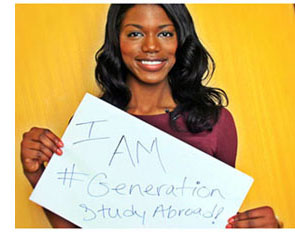 The May 1st Deadline to join Generation Study Abroad in time for the next public announcement of partners is quickly approaching. We encourage your institution to make a commitment now and be part of this important initiative. The May 1st Deadline to join Generation Study Abroad in time for the next public announcement of partners is quickly approaching. We encourage your institution to make a commitment now and be part of this important initiative. To date, more than 200 partners have joined and committed to take specific, measurable actions to expand study abroad opportunities for American students by the end of the decade. Partners so far include 180 campuses, as well as foreign governments and exchange agencies, education associations, and other educational organizations. We are deeply grateful to those who have already joined.
Already, our initial announcement of the launch of the campaign has generated a great deal of awareness about the importance of U.S. student mobility and study abroad. We are working with the commitment partners to publicize their participation, and many campuses have had great success in having their efforts featured in local and national news. Generation Study Abroad was also highlighted in CNN’s feature coverage of First Lady Michelle Obama’s trip to China where she spoke out about the value of cross-cultural learning.
Please visit Join Generation Study Abroad to see how you can get involved.
Application Deadline: May 30, 2014 | Application and Fellowship Details
The Thomas J. Alexander Fellowship Programme will support individuals in conducting quantitative, evidence-based research on education, particularly in emerging economies, and in linking that research to education policy and practice.
The program, named after the former director of the OECD’s Education, Employment, Labor and Social Affairs department, will provide funding for one year, including time spent at OECD headquarters in Paris. Fellows will be expected to produce a publishable research paper or report at the end of their fellowship. Fellows will work in close collaboration with OECD analysts.
Fellows will be selected among individuals working at research institutions, government agencies or professional organizations. Candidates with a doctoral degree, who are familiar with quantitative research methods and the use of large-scale surveys, and who have published work in scientific journals are encouraged to apply. Selected fellows will be invited to work at the OECD headquarters in Paris, typically for six months. In exceptional cases, proposals of outstanding originality and promise that do not fully meet the criteria for a fellowship and residency in Paris may be considered for an innovation award.
Research proposals will be selected on the basis of their originality, potential and scientific rigor. All policy-relevant topics will be considered, particularly those focusing on equality of opportunity.
Fulbright
The core Fulbright U.S. Scholar Program offers hundreds of opportunities for American faculty, researchers and professionals to conduct research, lecture, and/or consult with other scholars and institutions in countries.
With approximately 54 award offerings and close to 150 grants funded annually, the East Asia Pacific region, considered to be the world’s growth engine in economics, politics and culture, is the second largest regional program within the core Fulbright U.S. Scholar Program. The region endorses applications in all disciplines and supports flexible grant options for academics, professionals, and non-Ph.D. holders. Early career to distinguished chair awards are offered to support scholars at every stage of their career. Explore core Fulbright U.S. Scholar opportunities in the East Asia and the Pacific region, by visiting the regional pages on our website.
Learn more about the personal experience of a recent Fulbright Scholar to Vietnam, Michael Goldberg. Visiting Assistant Professor of Design and Innovation at Case Western Reserve University's Weatherhead School of Management, Michael discusses his family's Fulbright experience living in Vietnam in a video profile and blogs about the impact that this experience had on the development of a new MOOC on the subject of entrepreneurship in transitioning economies.
The Fulbright Program, sponsored by the U.S. Department of State’s Bureau of Educational and Cultural Affairs, is the U.S. government’s flagship international exchange program and is supported by the people of the United States and partner countries around the world. For more information, visit eca.state.gov/fulbright.
Study Abroad
Submission Deadline: May 23, 2014
IIE is seeking article submissions that highlight best practices and explore bold new ideas for doubling the number of U.S. students who study abroad by the end of the decade for its fall edition of the IIENetworker magazine, "What Will It Take to Double Study Abroad?"
Proposed articles should identify and examine ways to break down barriers (perceived and real) hindering students from participating in an international experience, such as obstacles related to cost, curriculum, and culture; share successful strategies and best practices in increasing study abroad; or discuss ideas for improving study abroad experiences for students already taking part. Articles on expanding diversity in race and ethnicity, academic disciplines, and gender are strongly encouraged. We also encourage contributions from professionals outside the strictly higher education structure, including those in K-12, language learning, and the private and government sectors.
Scholar Rescue Fund
Paul Hockenos writes in the Chronicle of Higher Education about a recent conference held in Amsterdam examining political threats that academics and institutions face in authoritarian nations. The article discusses new kinds of threats, including religious authoritarianism and the current crisis in Syria "where the civil war and lawlessness have forced academics and their families to flee for their lives."
|
| www.iie.org/iienetwork • Member website of the Institute of International Education © 2025 Institute of International Education. All rights reserved. |

